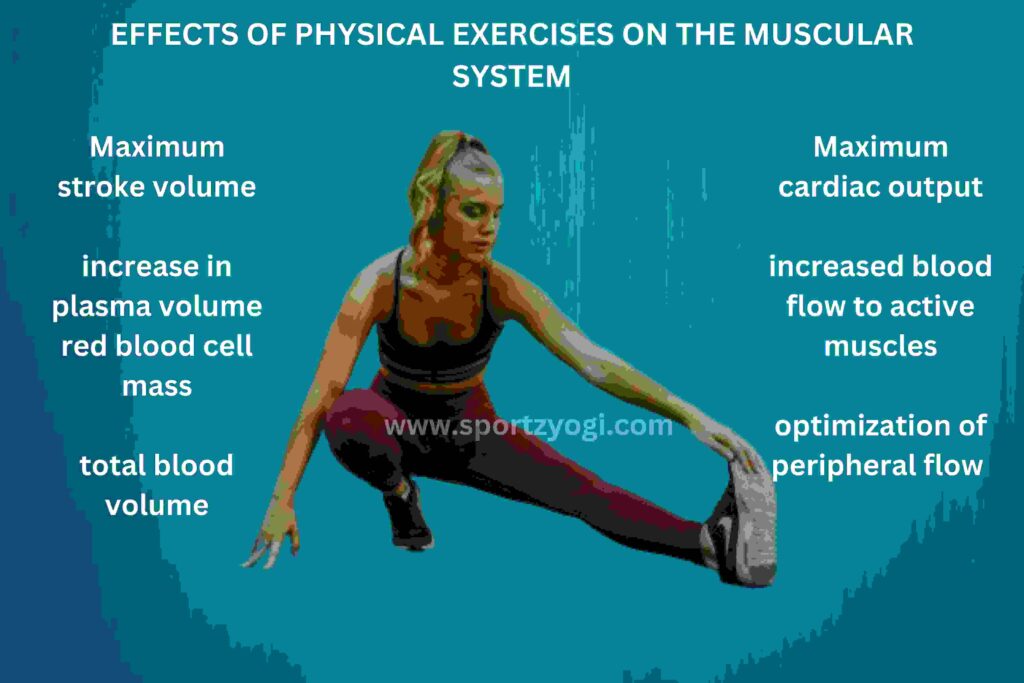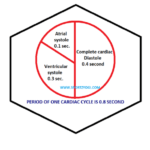EFFECTS OF PHYSICAL EXERCISES ON THE MUSCULAR SYSTEM
The effect of physical exercise on the muscular system- About half the weight of our body is made up of our muscles, For example, in an average individual, muscle mass constitutes approximately 30-40% of total body mass. This percentage may differ by so many factors such as age, sex, genetics, and level of physical activity. Muscles help to make our bodies move. There are about 650 muscles in our body and each one helps us in producing a particular movement. Muscles move our body with the help of bones. Blood is pumped throughout our body by the heart muscles. Several movements and activities of our body require many muscles, working together.
The purpose of this section is to explore various changes in different systems of the body concerning the Physiological mechanisms involved as well as to the relevant training factor. The teachers of Physical Education, Coaches, Sports persons and Students, of Physical Education, must be aware of the effects of Physical Exercise training on various systems to realize the qualitative changes in the body for better performance.
There are three major muscle contractions namely:
Isotonic Contractions,
Isokinetic contractions.
Isometric Contractions
- Isotonic/dynamic/concentric contraction is muscle contraction in which the muscle shortens with varying (different) tension while lifting a constant load.
- Isometric static or eccentric contraction is muscle contraction in which tension is developed but there is no change in the length of the muscle.
- Isokinetic contraction is muscle contraction executed (performed) at a constant speed and in such a manner that the tension developed by the muscle while shortening is maximal over the full range of joint motion.
Physical Exercises/Training, particularly resistance or weight training, affect our muscular system to a great extent. Many parameters of the muscular system get changed after resistance training.
READ MORE ABOUT-https://www.sportzyogi.com/chemical-composition-of-the-body/
These are described here as under: –
Hypertrophy of the Muscle
An increase in thickness in individual muscle fibers is called hypertrophy. Gains in strength and muscular endurance usually depend on the size of individual muscle fibers. The hypertrophy (increase in size) of muscle physical training especially weight training causes the following effects:
- Due to resistance training the size of muscle fibers increases.
- The total amount of proteins increases, which is essential for muscle growth.
- Capillary density per fiber also increases which causes more energy production.
- The amount of connective tissues increases in the muscles.
- The blood supply in the muscles increases.
- Due to hypertrophy muscular strength and muscular endurance increase.
Effect of physical exercise on muscular system
Biochemical Changes in Muscles
Aerobic Changes in the body
- Myoglobin content increases, Myoglobin is an oxygen-binding compound found in muscle tissue that acts as an oxygen store and helps in oxygen diffusion.
- Oxidation (breakdown) of carbohydrates and fat increases.
- The number of mitochondria also increases thus more muscular energy is produced.
- The level of activity of concentration of enzymes increases. Enzymes are protein compounds that speed up chemical reactions in the muscles.
- The amount of glycogen stored increases as a result of training. Glycogen is essential for energy production in the muscles.
Anaerobic Changes
- ATP+PC System capacity increases thereby more energy is released. ATP means Adeno Tri Phosphate and PC means Phosphocreatine. ATP-PC system is an anaerobic energy system in which ATP is manufactured when the PC is broken down.
- Glycolytic capacity also increases as a result of training.
Body Composition Changes
- For most individuals weight or resistance training produces little or no change in total body weight but the body composition changes considerably.
- There can be significant losses of relative and absolute body fat.
- Fat-free weight or muscle mass increases significantly.
- Change in Muscle and Joint Motion also takes place,
- After training flexibility increases which plays an important role in physical activities and sports to enhance performance and prevent serious muscular injury.
Summary of Effects of Physical Exercise on the Muscular System
- The size of muscle fibers increases in the body.
- The amount of Protein increases.
- Capillary density per fiber increases.
- The amount of connective tissue increases.
- The blood supply in the muscles increases.
- Myoglobin content increases.
- Oxidation of carbohydrates and fats increases.
- The number of Mitochondria (the Powerhouse of the cell) increases.
- Level, of activity of concentration of enzymes and amount of glycogen stored increases.
- ATP-PC and glycolytic capacity increases.
- Total and relative body fat is decreasing.
- Fat-free free-weight (muscle mass) is increased.
- Flexibility increases.





